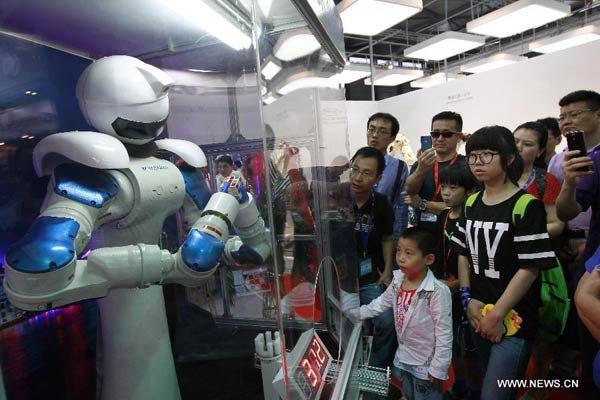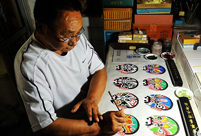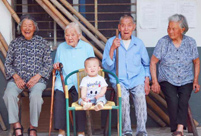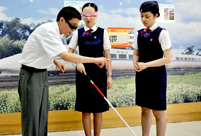 Global ambassadors of ecotourism gather in Nanjing
Global ambassadors of ecotourism gather in Nanjing
 Taiwan woman marries into Kazak family, 100 sheep plus a flat as dowry
Taiwan woman marries into Kazak family, 100 sheep plus a flat as dowry
 College girls take graduation photos under water in Chongqing
College girls take graduation photos under water in Chongqing
 Cartoon: Xi and football
Cartoon: Xi and football
 Chinese influence sweeps ROK
Chinese influence sweeps ROK
 Post-90s beauty boxer grapples four men
Post-90s beauty boxer grapples four men
 3,000-year-old tea town through lenses
3,000-year-old tea town through lenses
 22 archaeological sites along Silk Road in China
22 archaeological sites along Silk Road in China
 Football babies, Samba dancers embrace 'World Cup'
Football babies, Samba dancers embrace 'World Cup'
 Beautiful scenery along China’s Grand Canal
Beautiful scenery along China’s Grand Canal

China seems ready to embrace the age of the robot, with exhibitors attending the three-day China International Robot Show, which started on Wednesday in Shanghai, expressing confidence in a thriving Chinese robotics industry.
The expo, encompassing some 16,000 square meters, attracted more than 200 companies from over 50 countries and regions. It is estimated that 60,000 visitors will attend the event, far outnumbering the 27,371 visitors tallied last year.
Many global heavyweights are taking part in this year's show, including Comau Group from Italy, Staubli Robotics of Switzerland and Kawasaki Heavy Industries Ltd from Japan. The key industry players have brought their latest products to the show and are getting a lot of attention from interested Chinese buyers.
One of Comau's primary exhibits is the Racer 7-1.4 robot, which can perform a number of tasks, including arc welding, assembling and disassembling, sealing daily chemical products, sorting, removing, measuring and polishing.
According to Li Jing, marketing manager at Comau (Shanghai) Engineering Co Ltd, the company has received two orders for Racer so far, both from Chinese companies.
Japanese industry leader Kawasaki has also had a good response to its products this year. As a major supplier for automakers such as Toyota Motor Corp and Tianjin FAW Xiali Automobile Co Ltd, Kawasaki saw its China sales revenue double annually. The year 2013 was also extremely fruitful.
As Zhou Jianghua, sales manager of Kawasaki Robotics (Tianjin) Co Ltd Shanghai Branch, said, not just Kawasaki but the entire Chinese robotics industry is expected to grow by 20 percent a year through 2020.
"First, the ever-rising labor costs in China will make the country more reliant on robots," Zhou said. "Second, it caters to the country's need of industrial upgrading, which indicates higher dependence on automation and precision. Third, the use of robots will guarantee the rate of finished products and thus enhance management efficiency."
China became the largest robotics market last year with a total of 27,000 industrial robots being sold by overseas companies in the country, up 20 percent year-on-year, according to statistics provided by the International Federation of Robots in June.
According to the China Robot Industry Alliance, domestic companies sold more than 9,500 industrial robots in the country last year, which was three times the number sold a year earlier.
Noting the industry's rapid changes, Chinese authorities released a number of policies to further accelerate the transformation already taking place. The Ministry of Industry and Information Technology released guidelines for promoting the development of industrial robots in late December.
President Xi Jinping reiterated on Wednesday that the technical level and manufacturing capability of Chinese robots should be improved as soon as possible in order to take the lion's share of the market.
Local governments have also released similar plans to catch up with the trend. Zhejiang province, which is known for exports largely dependent on low-cost labor, announced that 36,000 local companies will be replacing human workers with machines by 2017. The annual investment is expected to be more than 300 billion yuan ($48 billion).
 How Chinese men kill the time when their wives practice square dancing?
How Chinese men kill the time when their wives practice square dancing? Chinese Navy frogmen in training: photos
Chinese Navy frogmen in training: photos Lishui, city of longevity with 186 healthy men above 100 years old
Lishui, city of longevity with 186 healthy men above 100 years old Hong Kong Fashion Festival kicks off
Hong Kong Fashion Festival kicks off Germany crush Brazil to advance to World Cup final
Germany crush Brazil to advance to World Cup final Danish badminton team plays Chinese social media users on Asia tour
Danish badminton team plays Chinese social media users on Asia tour Art on eggshells
Art on eggshells Test flight of Russian amphibian BE-103 in Shenyang, NE China
Test flight of Russian amphibian BE-103 in Shenyang, NE China Stewardesses of CHR trains experience walk with white cane
Stewardesses of CHR trains experience walk with white cane Chengdu police use social media to boost recruitment
Chengdu police use social media to boost recruitment Secrets unveiled in restoration of the 800-yr-old Buddha
Secrets unveiled in restoration of the 800-yr-old Buddha Heavenly path in Chongli grassland
Heavenly path in Chongli grassland Happy Birthday to "Yuanzai"
Happy Birthday to "Yuanzai" China's manned submersible Jiaolong opens to public
China's manned submersible Jiaolong opens to public Roast Duck Restaurant celebrates 150th anniversary
Roast Duck Restaurant celebrates 150th anniversaryDay|Week|Month